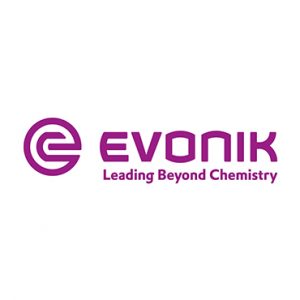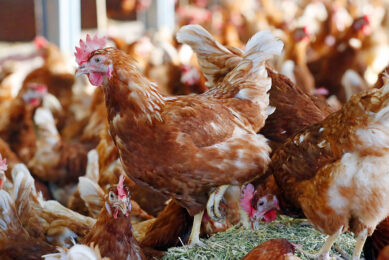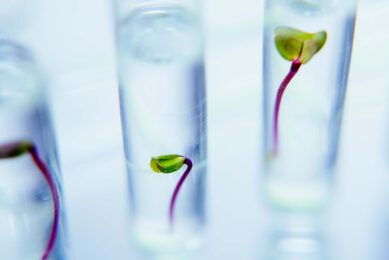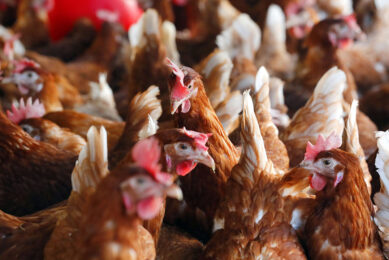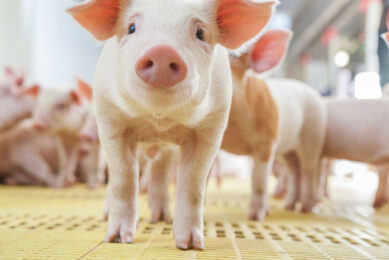Advanced feeding concept to optimise swine gut health
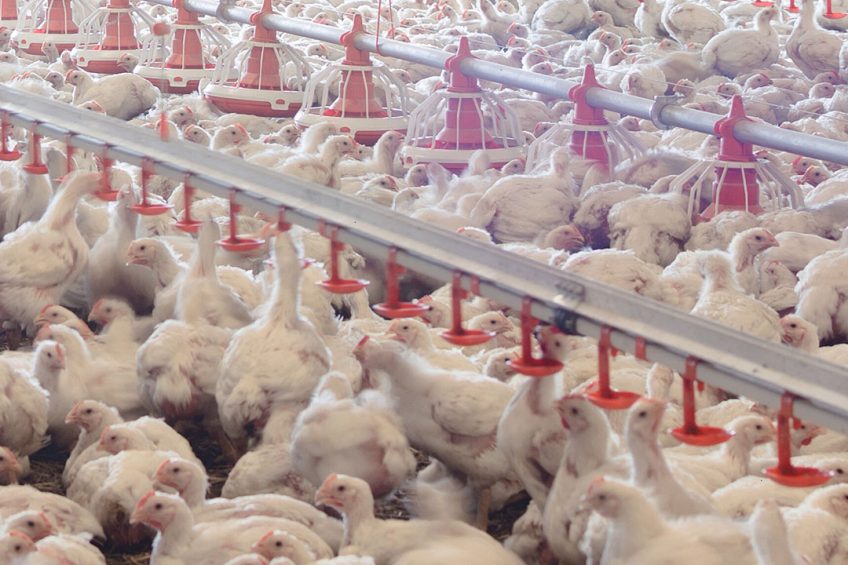
The gut plays host to more than 500 commensal microbiota species which help protect it against harmful pathogens. Ensuring a good balance of the gut microbiota will play an important role for the gut and the overall health of it.
The digestive tract (gut) is needed not only for digestion and absorption of nutrients, but it also serves as a barrier from pathogenic bacteria, and as a major immune organ containing more than a trillion lymphocytes (roughly 70% of the body’s immune system). The gut is also a dwelling place for more than 500 commensal microbiota species which suppresses the proliferation of pathogenic bacteria and modify gut immune function under healthy (symbiosis) conditions. A balanced gut microbiota plays an important role for the gut and overall health.
Multiple stressors at weaning and dietary factors, such as poor feed quality and a high protein diet, can cause gut microbiota imbalance (dysbiosis) which can reduce gut immune system and impair gut barrier function. This allows pathogenic bacteria such as E. coli to attach to the mucosal cell wall and proliferate, causing post-weaning diarrhoea (PWD). This can lead to reduced performance and increased medication, impacting profitability. For weaned pigs, F4 (K88) and F18 are the 2 Enterotoxigenic E. coli strains causing PWD in weaned pigs globally. The use of in-feed antimicrobial growth promoter (AGP) and zinc oxide (ZnO) have been effective to control PWD. However, due to the development of antimicrobial resistance in humans, there is a need for alternatives to AGP and ZnO.
Benefits of using analysed values in low-protein diets in gut health
The amino acids (AA) and crude protein (CP) content of raw materials can vary among different sources. A lack of nutrient analysis of ingredients or using ‘table’ values can reduce the accuracy of feed formulation. Formulating diets with high CP content results in a greater amount of undigested protein in the hindgut, causing proliferation of pathogenic bacteria, e.g. E. coli and toxic metabolites, leading to inflammation of the gut and PWD.
Additionally, high CP diets result in higher nitrogen (N) and ammonia emission to the environment. Lowering dietary CP levels directly impacts gut health by reducing diarrhoea incidence in weaned pigs, it can also greatly reduce N excretion not only for growing-finishing pigs but also for weaned pigs, i.e. 1%-unit CP reduction in the diet can reduce N excretion by roughly 9% and drinking water by 3%.
Roles of functional amino acids under immune challenge
Besides body protein synthesis, some functional AA are involved in gut barrier function and modulation of immune function. The results of a recent study showed that average daily gain (ADG) of weaned pigs was reduced by Salmonella challenge but it was counterbalanced (50% increase) by adding Thr, Met and Trp at 120% of requirement in both high CP (HP AA+) and low CP diets (LP AA+) as illustrated in Figure 1. Data from the same study showed that increased ADG was due to an increase in antioxidant capacity by these AA.
Figure 1 – Effect of amino acids supply on ADG of weaned pigs challenged with Salmonella.
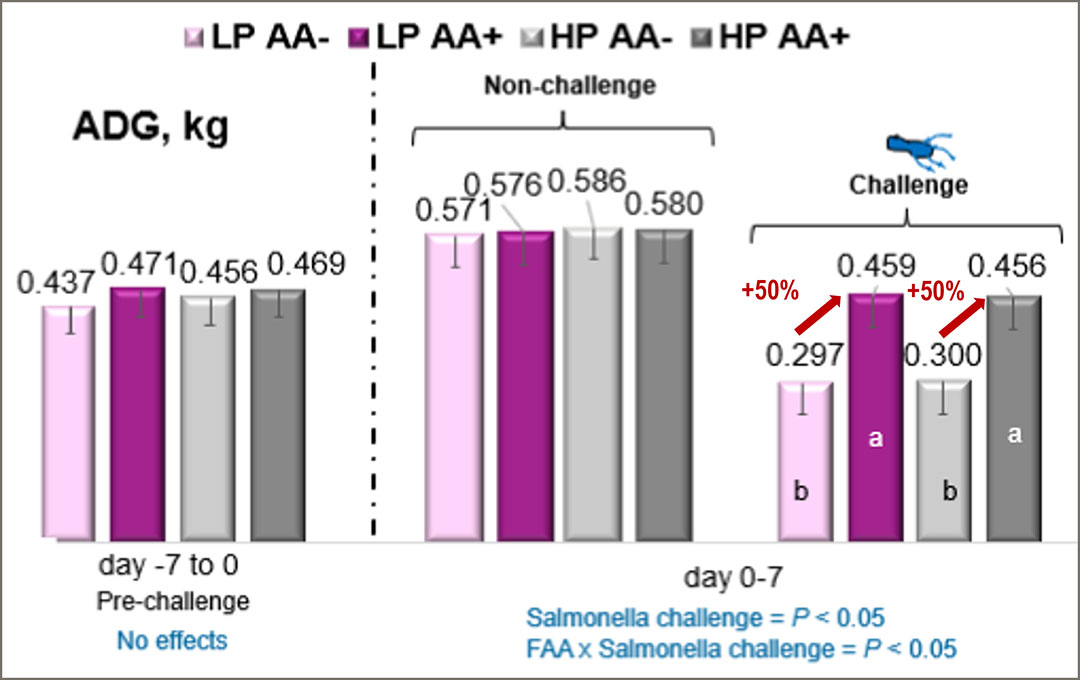
Probiotics (live microorganisms) are one of the functional feed additives used to improve gut health. Most probiotics are based on bacteria (Bacillus-based and lactic acid producing), and yeasts. Bacillus strains have advantages as they can form endospores and resistance to heat processing and harsh (bile) conditions in the gut. GutPlus (B. subtilis 32540) is a probiotic particularly developed for swine application by Evonik, which can inhibit pathogens including E. coli, can produce secondary (antimicrobial) metabolites, lactic acid and compatible with organic acids and AGP. Numerous studies show the beneficial effects of probiotics on the gut heath of pigs.
A 21-day experiment was conducted at the University of California, Davis, evaluating the effect of additions of GutPlus and another Bacillus strain (500 g/ton) under challenge with E. coli F18. As shown in Figure 2, the frequency of severe diarrhoea (score >4) was lower in pigs fed the GutPlus diet. The body weight (BW) on day 7, 12 and 21 was greater in pigs receiving GutPlus in the diet under E. coli challenge. Data from the same study showed an increase in the number of goblet cells in duodenum, as well as a greater mucin area in the villi of jejunum. The translocation of coliform bacteria was lower in the lymph nodes by addition with the product. A lower concentration of serum haptoglobin (acute phase protein) was seen on day 3 and day 6 post-challenge which indicates a reduced level of systemic and gut inflammation.
Another study was conducted at South Dakota State University evaluating the effect of GutPlus (500 g/ton) or AGP in weaned pigs challenged with E. coli K88. Results showed that villus height and villus height:crypt depth (VH:CD) in jejunum was greater as well as gain:feed (G:F) was increased by addition of the B. subtilis product or AGP indicating that AGP may be replaced with GutPlus under E. coli challenge conditions.
Figure 2 – Effect of GutPlus on diarrhoea and growth of weaned pigs challenged with E. coli
F18.
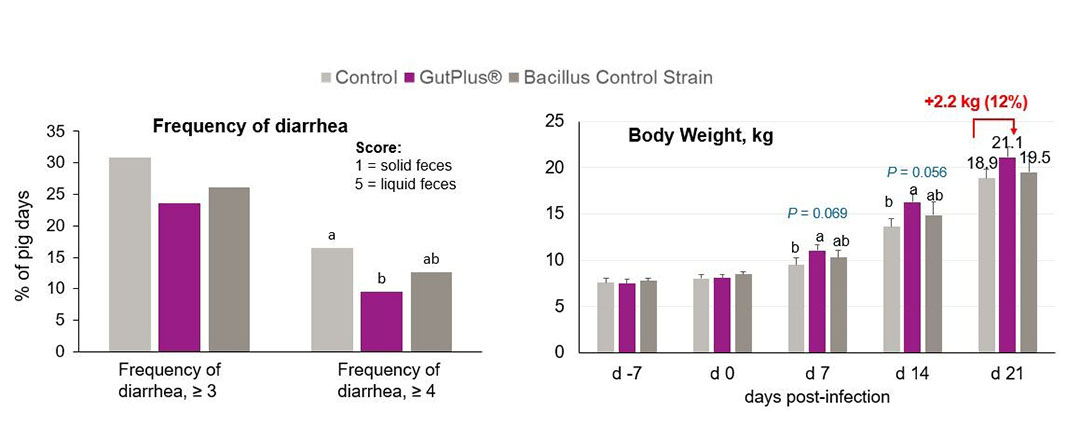
Synergistic effects of probiotics and low CP diets
Evonik also conducted a 42-day in collaboration with Sichuan Agricultural University trial to determine the effect of supplementation with a Bacillus subtilis-based probiotic in a high and low CP diets under normal production conditions in China. The effect of CP level was not observed for all parameters measured. Both ADG and G:F increased with probiotic addition but interestingly the best performance was achieved with combining probiotic with low CP diet (Figure 3). The greatest VH:CD ratio as well as gene expression of tight junction proteins in ileum were observed in pigs fed the low CP diets supplemented with probiotic indicating a possible synergistic effect of combing low CP with probiotic addition. This may be because probiotics can out-grow in the gut better when proliferation of pathogenic bacteria is reduced due to less undigested substrate with reducing CP content in the diet.
Figure 3 – Effect of dietary CP level and B. subtilis probiotic addition on performance and gut morphology of weaned pigs.

AGP-free gut health concept
Based on our trial results, the probiotic GutPlus addition in diets of weaned pigs can improve gut health, decrease diarrhoea incidences, and improve performance of weaned pigs like the levels achieved with antibiotics. Reducing dietary CP may act synergistically with probiotics to further improve gut health, performance, and reduced N excretion. A holistic approach of combining low CP diet, functional AA, probiotics (and potentially also with other gut health products) should be considered as part of AGP-free gut health concept towards more sustainable pig production.
References are available upon request


